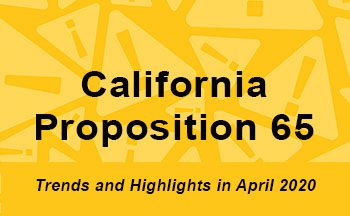Proposition 65 Notices of the Month – April 2020: Plaintiffs Target Various Food Products Including Vinegars, Baby Food Pouches, Teething Wafers, Seaweed and Seafood Products Amidst the COVID-19 Pandemic and California Court Closures
May 2020
Proposition 65: Trends and Highlights in April 2020
As COVID-19, shelter-in-place orders and California Court closures continued into April, new Proposition 65 (“Prop. 65”) claims were plentiful and creative, particularly as to food products. 60-day Notices of Violation (“Notices”) in April alleged that lead, acrylamide and carbaryl in foods including dried seaweed and seafood, balsamic vinegar and other vinegar products, baby food pouches and teething wafers require Prop. 65 warnings. Familiar claims regarding lead and plasticizers in consumer products also were numerous, as were claims that dietary supplements contained lead and therefore require Prop. 65 warning label.
Prop. 65, also known as the Safe Drinking Water and Toxic Enforcement Act of 1986, requires “clear and reasonable warnings” on consumer products (including foods) sold in California, if use of the products causes and exposure to chemicals on the Prop. 65 List. Our monthly overview of product trends in the Notices is as follows.
- Lead and Carbaryl in Balsamic Vinegar & Vinegar Products. Plaintiff groups issued 28 Notices alleging that lead and carbaryl content in balsamic vinegar and vinegar products required a Prop. 65 warning label. While Prop. 65 claims regarding lead in vinegars have been common over the years and resulted in prior settlements and litigation, the allegation that vinegars contain carbaryl appeared for the first time in April. Carbaryl is an insecticide. The State of California has determined that carbaryl causes cancer and reproductive harm, and that products exposing consumers to the chemical require a Prop. 65 warning.
- Acrylamide and Lead in Baby Food and Vegetable/Fruit Puree Pouches and Acrylamide in Teething Wafers. Plaintiff groups issued 44 Notices alleging that baby food and vegetable/ fruit puree products served in pouches contained acrylamide and lead and thus required a Prop. 65 warning label. Likewise, plaintiff groups issued 12 Notices alleging that teething wafers contained acrylamide and required a Prop. 65 warning, and similar Notices were sent alleging the same for baby cookies.
- Lead, Arsenic and Cadmium in Seaweed and Seafood Products. Plaintiff groups continued to allege that heavy metals in seaweed and other seafood products require a Prop. 65 warning. In January 2020, plaintiffs issued 14 Notices for various seaweed and seafood products including dried seaweed, dried shrimp, dried anchovies, and canned squid. In February 2020, plaintiff groups issued 20 Prop. 65 Notices for lead, arsenic and cadmium in dried/roasted seaweed products and 3 Notices for shrimp products. In March 2020, plaintiff groups issued 45 Notices for seaweed and other seafood products such dried krill, dried anchovies, shredded squid, and dried crab snacks. Last month, plaintiff groups issued 29 Notices for similar seafood products such as dried seaweed and squid.
- Lead in Dietary Supplements. 65 plaintiff groups also sent Notices for lead in dietary supplements. In April, plaintiff groups issued 15 Notices alleging that dietary supplements required a Prop. 65 warning.
- Lead and Plasticizers in Consumer Products: Lead (and related compounds) remain a common Prop. 65 chemical target in Notices for hardware products. Last month, plaintiff groups issued 20 Notices for claims of lead in hardware/brass products and other tools containing metal. Similarly, plaintiffs also targeted plastic bags and cases containing phthalate plasticizers. Di(2-ethylhexyl)phthalate (“DEHP”) (the most common type of phthalate plasticizer), and Diisononyl Phthalate (“DINP”) (another type of phthalate) were the subject of 31 Notices for products such as plastic bags and tote bags.
California’s court closures have created the opportunity of “extra time” for retailers and manufacturers to conduct Prop. 65 risk analyses as to the applicability of Prop. 65 warnings to the products they sell. Those receiving Notices during the COVID-19 California court closures can use this time to shore up their Prop. 65 procedures and evaluate settlement and/or defense of the Notices before the Courts reopen.

